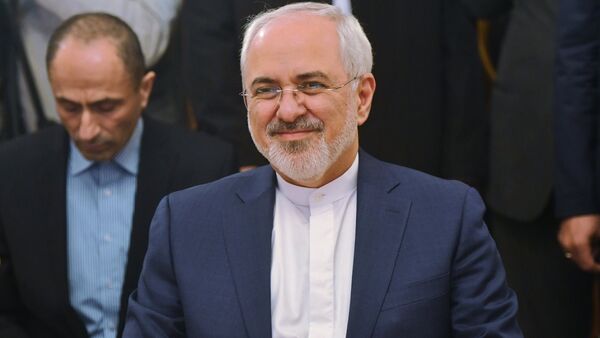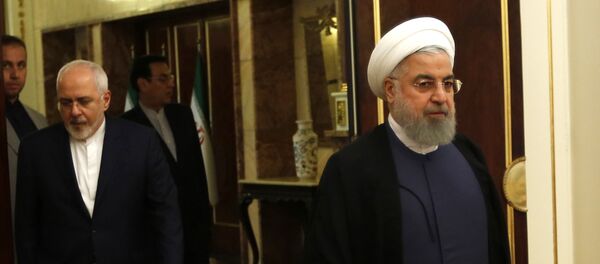Prior to the announcement of his resignation on Instagram on Tuesday, Zarif said in an interview that Iran's foreign policy is being 'poisoned' by the party and factional infighting. US Secretary of State Mike Pompeo tweeted that Zarif and Rouhani were “just front men for a corrupt religious mafia”, adding that US policy towards Iran will remain unchanged.
READ MORE: West's Arms Sales to Mideast Turned Region Into 'Powder Keg' — Iran's Zarif
59-year old Javad Zarif was educated in the United States and played a key role in negotiating the 2015 Iran nuclear deal.
Radio Sputnik discussed Javad Zarif’s attempt to resign with Dr. Mahjoob Zweiri, Director of Gulf studies center at the Qatar University.
Sputnik: What is your take on Mr. Zarif’s sudden resignation and then reports that his resignation was not accepted?
Mahjoob Zweiri: I think there were a lot of changes or criticism that was going on in the last few months since the United States withdrawal from the deal, especially [from] those who basically believed that the deal itself didn’t work. I think Zarif himself was criticised because he was described as the main person engineering the whole deal. So that is one aspect. Another aspect, we remember also that he was called to the Parliament actually to justify why all of this happened. So there was a lot of focus on him and the criticism from different circles, especially the conservative circle — that is one fact.
Sputnik: What could have prompted Mr. Zarif’s announcement? As you mentioned, there were reports that he was excluded from the visit of Syrian President Bashar al-Assad.
Mahjoob Zweiri: I think now you appear to be correct because he said it himself. And then other sources and there is a source of confirmation today from Qasem Soleimani himself about this. So, it seems that it was the point where he said: “Enough is enough. I know I have to leave”, basically.
Sputnik: Doctor, and what next? I mean I have never met a person whose boss did not allow him to resign. Is he obliged to continue working? What next, now that President Rouhani has rejected his [Zarif’s] resignation?
Mahjoob Zweiri: I think they will try to convince him. At least I am aware that there is sort of pressure on him that, you know, that [if] you start the job, you have to finish it. And there are people who trust you. I would not be surprised if the Supreme Leader's office called him and said that Ali Khamenei wants him to stay. If Khamenei said he wanted him to stay, he will stay, basically.
Sputnik: How important is Mr. Zarif when it comes to maintaining Iran’s nuclear deal? What role does he play in maintaining the agreement?
Mahjoob Zweiri: At the end of the day, individuals are important but this I think that is one of the points [where] I disagree with the liberal analysis I am hearing, I am reading in the media. He is a foreign minister; he is appointed by the president. He is implementing what the establishment of Iran agreed on. So, basically, let’s put things in the right context. He is a person appointed by the president. He is implementing what the establishment has decided. Of course, his individual character, his interaction is important; no one can deny it. But again, even without Javad Zarif, things will continue I think, as they were. There will be maybe little differences but it is not true that if he resigns things will be a mess. I disagree with that. I think he is like other ministers, if he resigned, there would be a decision to replace him and things will move on.
READ MORE: 'Good Riddance': Netanyahu Takes Parting Shot at Iran's Departing FM Zarif
Sputnik: What do you make of Mr. Zarif’s statement that Iran’s foreign policy is being poisoned by party and factional infighting? There were reports that Iran’s foreign policy will start hardening in the face of a conceited campaign by the United States and its allies. What are your thoughts on that?
Mahjoob Zweiri: That was the trend in the last 40 years. When there is a clash with the United States, the foreign policy of Iran has become more radical. That was the trend in the last 40 years. What Zarif is saying [is that] he was true in a fact, in a way that he is actually saying that the division within the Iranian politics is complicating his job because those factions, those competitors with him from other factions, they are trying to undermine what he is doing. And I think this has been the case in Iran for the last 40 years, especially, when we are getting close to the parliamentary elections next year in 2020. And normally, a year before [the elections], this kind of competition starts between different factions and political parties and all those who want to win these elections. So, this is part of these actually early campaigns as I call it.
Sputnik: Mr. Pompeo welcomed his resignation. In your view, why did he react to his resignation the way he reacted?
Mahjoob Zweiri: I found the statement immature. I think maybe this is because Iran is on the top of their list. I mean this administration in Washington – Iran is number one on their list. And they wanted to make sure that they respond to everything happening in Iran. And that is I think that’s the reason why he made this statement; actually, he is trying to describe the minister and the president in a way one can’t say. It was not a diplomatic statement, by the way.
The views and opinions expressed in this article are solely those of the author and do not necessarily reflect those of Sputnik.




